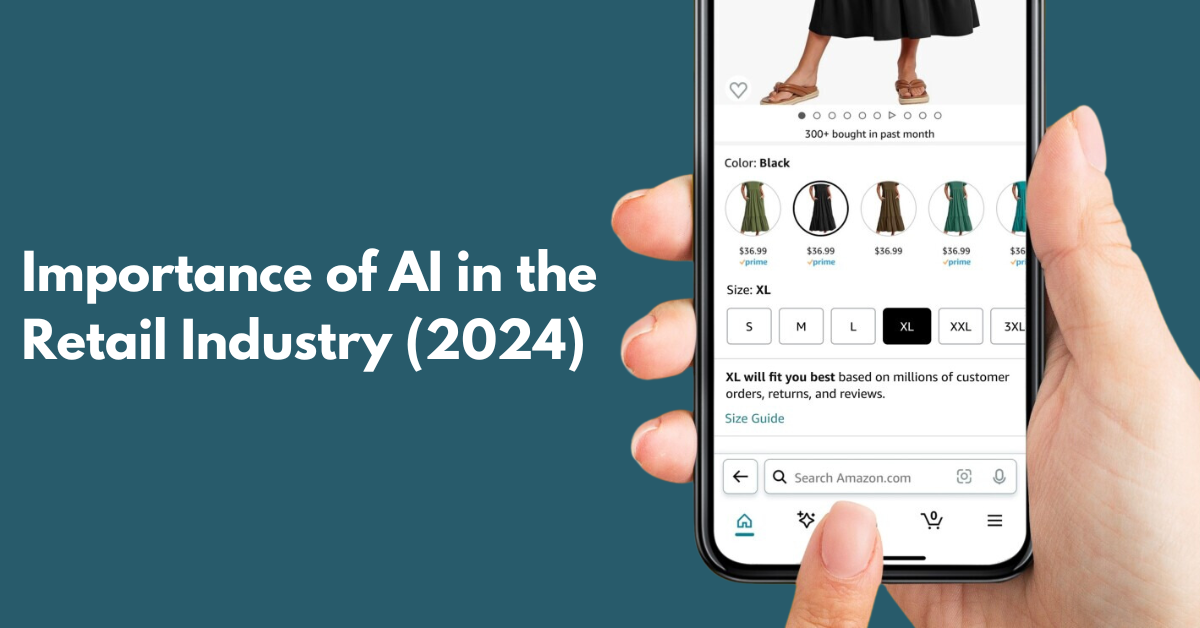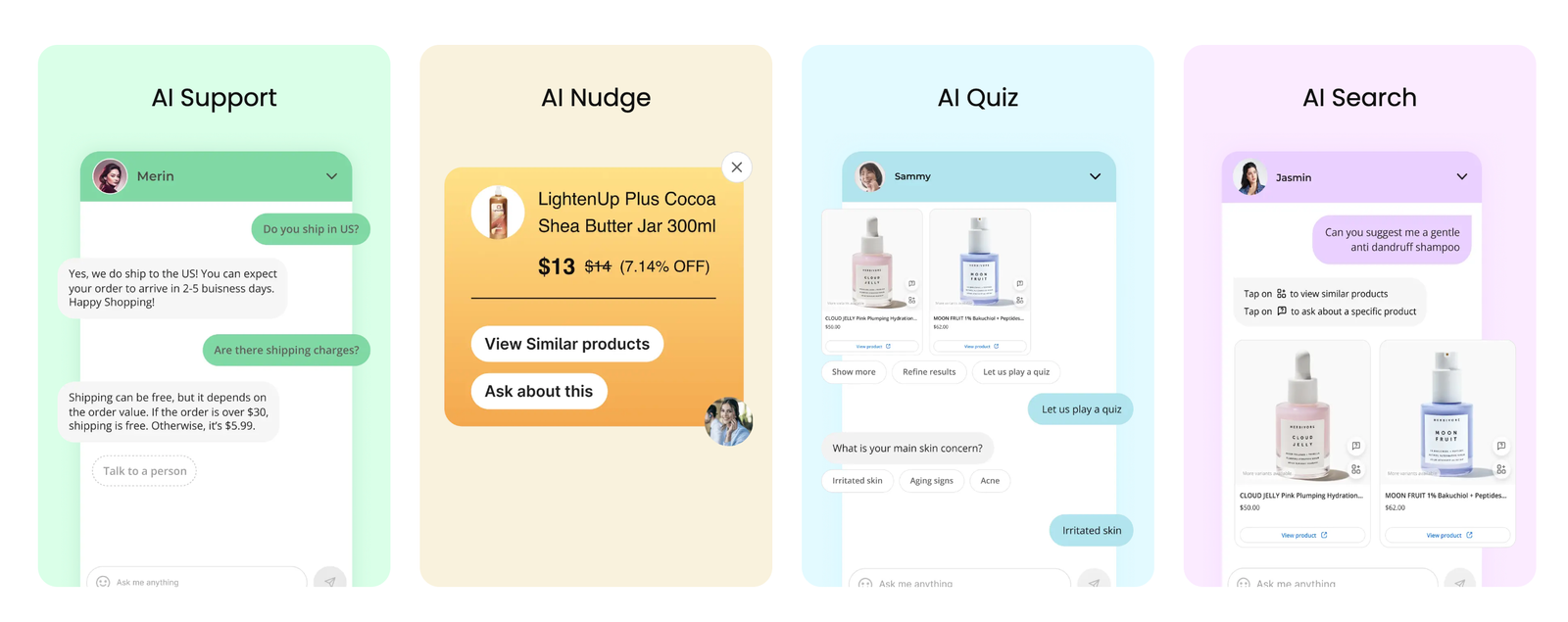Importance of AI in the Retail Industry (2024)

The retail sector is poised for significant change in 2024 as a result of the quick development of artificial intelligence (AI). Artificial Intelligence (AI) becomes a critical tool for retailers navigating a more competitive retail environment. AI in retail industry improves all aspects of the shopping experience, from individualized customer interactions to effective inventory management. Retailers can now anticipate trends and customize their products with never-before-seen accuracy thanks to the integration of AI technologies, which also expedites processes and lowers costs while delivering priceless insights into consumer behavior.
AI for retail represents a revolution in customer engagement that will make the retail ecosystem more efficient, personalized, and responsive. It's more than just a technological advancement.
Importance Of AI In Retail Industry

The importance of AI in the retail industry is multifaceted, revolutionizing various aspects of the business to enhance customer experience, optimize operations, and drive sales growth. Here are some key areas where generative AI in retail is making a significant impact:
Personalized Customer Experience
Recommendation Systems: AI algorithms analyze customer data to provide personalized product recommendations, increasing the likelihood of purchases. For example, Amazon's recommendation engine drives a substantial portion of its sales.
Customer Service: AI-powered chatbots and virtual assistants offer 24/7 customer support, handling inquiries and resolving issues efficiently, improving overall customer satisfaction.
Inventory Management and Supply Chain Optimization
Demand Forecasting: AI models predict future demand for products, helping retailers maintain optimal inventory levels, reduce stockouts, and minimize overstock situations.
Supply Chain Efficiency: AI optimizes logistics and supply chain operations by predicting delays, optimizing routes, and managing supplier relationships, leading to cost reductions and faster delivery times.
Pricing and Promotions
Dynamic Pricing: AI enables dynamic pricing strategies that adjust prices in real-time based on demand, competition, and other factors. This helps retailers stay competitive and maximize profits.
Promotional Effectiveness: AI analyzes past promotional data to determine the most effective strategies for future sales events, ensuring higher ROI on marketing efforts.
Enhanced In-Store Experience
Smart Shelves and Checkout: AI-driven smart shelves monitor stock levels and customer interactions, while cashier-less checkouts powered by AI and computer vision provide a seamless shopping experience.
In-Store Analytics: AI analyzes customer movement and behavior in-store to optimize store layout, product placement, and staffing levels, enhancing the shopping experience.
Customer Insights and Market Trends:
Sentiment Analysis: AI processes customer reviews and social media mentions to gauge customer sentiment, helping retailers understand their brand perception and improve products and services.
Market Trend Analysis: AI analyzes market trends and consumer behavior patterns to identify new opportunities and potential risks, enabling retailers to make data-driven strategic decisions.
Fraud Detection and Security
Fraud Prevention: AI detects fraudulent activities by analyzing transaction patterns and flagging suspicious behavior, protecting retailers and customers from fraud.
Security Enhancements: AI-powered surveillance systems enhance store security by identifying potential threats and preventing theft.
Operational Efficiency
Task Automation: AI in retail commerce automates routine tasks such as restocking, order fulfillment, and customer inquiries, freeing up staff to focus on more complex and value-added activities.
Workforce Management: AI optimizes workforce scheduling and task assignment based on demand forecasts and employee performance data, improving overall productivity.
AI In Retail Examples

Here are some notable examples of AI applications in retail commerce:
1. Amazon - Personalized Recommendations and Alexa
Amazon uses AI to analyze customer behavior and preferences, providing personalized product recommendations. This is powered by machine learning algorithms that continuously improve with more data. Additionally, Amazon’s Alexa offers voice-activated shopping, allowing customers to make purchases using voice commands.
2. Walmart - Inventory Management with Bossa Nova Robots
Walmart employs AI-powered robots from Bossa Nova Robotics to scan shelves and manage inventory. These robots help ensure products are in stock and shelves are properly organized, significantly improving inventory accuracy and reducing manual labor.
3. Sephora - Virtual Try-On with Augmented Reality (AR)
Sephora uses AI and AR to provide virtual try-on experiences for makeup products. Customers can use the Sephora app or in-store mirrors to see how different products will look on their faces without physically applying them, enhancing the shopping experience and reducing product returns.
4. H&M - Personalized Fashion Recommendations
H&M utilizes AI to analyze customer data and provide personalized fashion recommendations both online and in physical stores. By understanding customer preferences and shopping habits, H&M can offer tailored product suggestions, driving higher engagement and sales.
5. Zara - Predictive Analytics for Trend Forecasting
Zara employs AI for trend forecasting and inventory management. By analyzing social media trends, customer feedback, and sales data, AI helps Zara predict fashion trends and adjust their inventory accordingly, ensuring they have the right products at the right time.
6. Starbucks - AI-Powered Personalization
Starbucks uses AI through its “Deep Brew” initiative to personalize customer experiences. The AI system analyzes customer preferences and behaviors to offer personalized recommendations and promotions through the Starbucks app, enhancing customer loyalty and increasing sales.
Future Of AI in Retail

The future of AI in retail is closely intertwined with innovations like Manifest AI, which enhances online customer support through its GPT-powered AI shopping assistant. This technology integrates seamlessly with retail systems to automate responses and provide personalized assistance, significantly improving efficiency and customer satisfaction.
With Manifest AI, retailers can expect a more streamlined support process, handling every customer query promptly and effectively. This not only saves time but also ensures that customers feel valued and understood, boosting loyalty and driving sales. By adopting AI solutions like Manifest AI, retail businesses can stay competitive and responsive in an ever-evolving market.
- Multilingual Support: Manifest AI caters to a global audience by providing support in multiple languages, ensuring that no customer feels left out due to language barriers.
- Personalized Customer Experience: By leveraging customer data, Manifest AI offers tailored product recommendations and support, making each customer interaction feel unique and personal.
- Increase Average Order Value: By suggesting relevant add-ons and upgrades, Manifest AI helps boost the average order value, enhancing overall sales per customer.
- Increase CSAT Score: By delivering swift and accurate responses to inquiries, Manifest AI significantly improves customer satisfaction scores.
- Increase Add to Cart Rate: Manifest AI enhances the shopping experience by proactively assisting customers, leading to higher engagement and increased add-to-cart rates.
Conclusion
The importance of AI in the retail industry in 2024 cannot be overstated, as it continues to revolutionize every aspect of the sector. From enhancing personalized customer experiences and optimizing inventory management to driving sophisticated predictive analytics and automating supply chain operations, AI is becoming the backbone of modern retail.
By leveraging AI technologies, retailers can not only meet the evolving demands of consumers with greater precision and efficiency but also create more sustainable and ethical business practices. As the industry moves forward, the integration of AI will be essential for maintaining competitiveness, fostering innovation, and delivering superior value to customers in an increasingly digital and data-driven marketplace.

.png)
